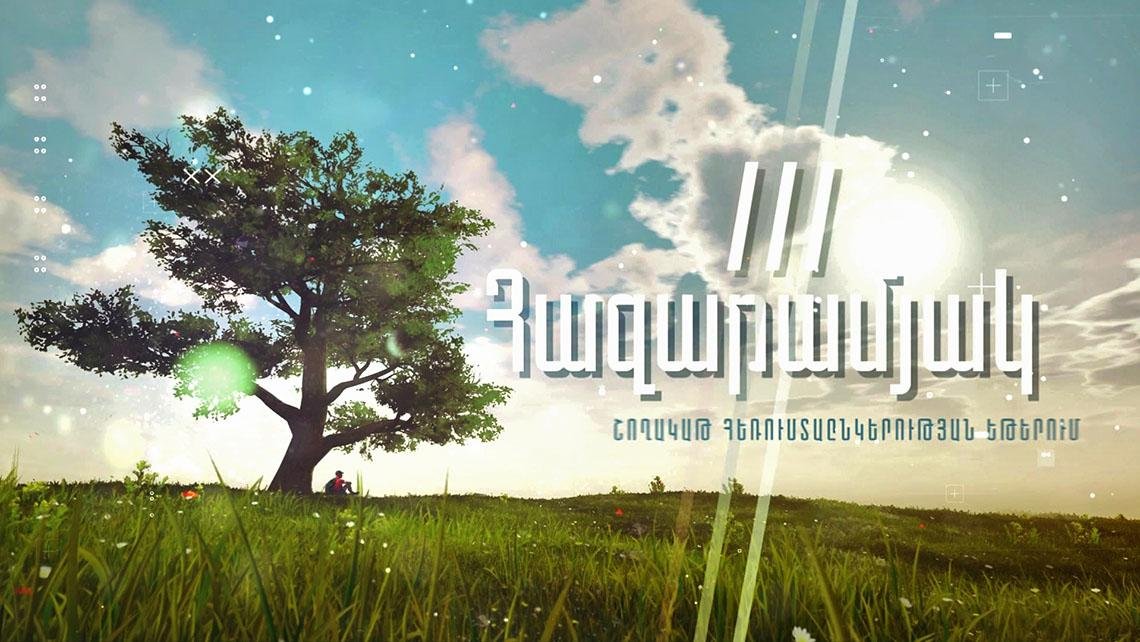
Author and host: Anna Sargsyan
In this rapidly changing modern world, an individual faces the issue of self-expression, while the societies need new identity marks. The ever-lasting question that always concerned humanity, universal values are tested in every society in its unique way and require solutions from each individual separately.
“Post-Soviet Armenian Reality”, “Collective Memory”, “Knowledge and Information”, “Lessons of Independance”, “Language and Self-Cognition”…. All these are the topics that are discussed with merited and young scientists, artists and priests in the pavilion of Third Millennium.
The TV series were first created in 2005. In 2011, it won the annual award of Yerevan Press Club for developing the culture of dispute
Frequency: every Thursday, at 21:55
Rerun: Friday, at 13:00, Sunday, at 15:15
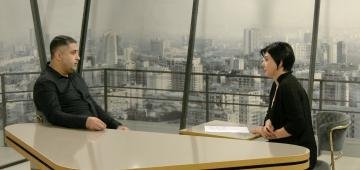 |
Creeping peace
Whose war is the peace treaty to advance? Anna Sargsyan discussed the topic with Gevorg Melikyan, director of the "Armenian Institute of National Resistance", candidate of political sciences.
|
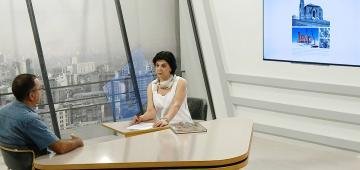 |
Vandalism: state policy of Azerbaijan
The Foundation for the Study of Armenian Architecture published the booklet "State Policy of Vandalism in Azerbaijan". The English book published by the initiative of the Artsakh Diocese exposes the multi-year anti-cultural activities of Azerbaijan with facts. Anna Sargsyan discussed the topic with the fund's co-director Raffi Kortoshyan.
|
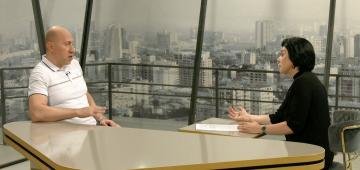 |
How to get a decorative state?
Amendment of the RA Constitution, review of state symbols, review of the past, reduction of the role of national structures, etc. What do these theses put on the Armenian political agenda have to do with the security of the state and the desired peace? What is the real demand presented to Armenia by Azerbaijan and Turkey? How does Armenia react to that demand? Anna Sargsyan discussed the topic with political commentator Hakob Badalyan.
|
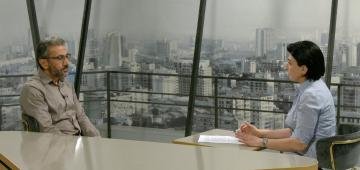 |
How to enjoy life and prepare for war
The head of the government says that the times of scraping are over, the time to live has come. The Ministry of Foreign Affairs of the same government declares: peace is aborted, prepare for war. What does a citizen agree to live with? What does the ruling power get? Anna Sargsyan discussed the topic with public administration specialist Hovhannes Avetisyan.
|
 |
The movement as a result of the state crisis
Has the domestic political life in Armenia ever been fueled by the talk of the state's security or struggle for sovereignty? What makes the "Tavush for the sake of the Motherland" movement unprecedented? Who benefits from the sharp polarization of society? Anna Sargsyan discussed the topic with ethnographer Arsen Hakobyan.
|
 |
The people of Artsakh are going through a difficult psychological period
The encirclement of Artsakh by Azerbaijan was a type of military operation. When it is not possible to capture the fortress, they close the entrances and exhaust, starve and despair those inside. Even after being in that difficult situation for 10 months, people were ready to endure and live in their land. But on September 19, the enemy launched an attack against unarmed and besieged Artsakh using all modern weapons and in large numbers. In terms of military equipment and numbers, Azerbaijan was many times superior to Artsakh, which resisted for a whole day. Added to that was the explosion near Stepanakert, which killed hundreds of people. People who have gone through all this experience collective and individual traumatic shock, post-traumatic mental disorders, complex psychological, socio-cultural stages of forced resettlement and adaptation. Anna Sargsyan discussed the topic with candidate of psychological sciences, associate professor Vitya Yaramishyan.
|
 |
The Armenian Church in times of national disaster
There has been confusion about the results of the charitable and structural work of the Armenian Church during the 2029 war, and then in the post-war period. Some citizens accuse the Armenian Church of being apathetic or indifferent. Some part of the public also blames the church for not talking much about the extensive assistance provided. At the request of the media, His Eminence Archbishop Nathan Hovhannisyan, Director of the Foreign Relations and Protocol Department of the Mother See, presented the activities of the Armenian Church in a number of directions: financial support to the RA government, treatment support for the disabled, various assistance to the besieged and then exiled Artsakh Armenians, the works related to the return of prisoners of war and hostages and their results. Some details are being published for the first time.
|
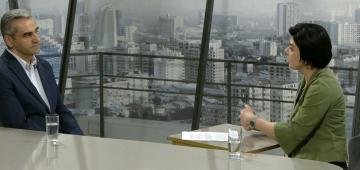 |
The Lemkin Institute blames the RA Prime Minister
The Lemkin Institute for Genocide Prevention accused the Prime Minister of Armenia for the narratives denying the Armenian Genocide. "Although we generally do not get involved in the internal affairs of states, as long as there is no threat of genocide, we must address the concerns arising from the recent statements of Armenian Prime Minister Nikol Pashinyan, which, in fact, deviate from the fundamental principles of genocide prevention, genocide recognition and transitional justice, and which are directly related to are the problems of national security of Armenia", says the foreword to the detailed 5-page report. Anna Sargsyan discussed this topic with Genocide expert Suren Manukyan.
|
 |
From Retreat democracy to demarcation
What is the basis of the illegality of the process carried out under the name of demarcation in the territory of Tavush region? Why does the RA government violate the RA Constitution and accuse those fighting against it of "playing politics"? What legal ways are there to implement the process of reproduction of the Armenia-Azerbaijan interstate border? Anna Sargsyan talked with the member of the Supreme Spiritual Council of the Mother See, doctor of legal sciences, professor Gevorg Danielyan.
|
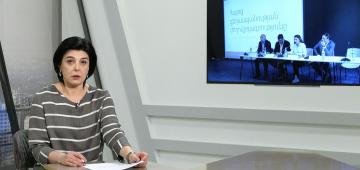 |
How many millions would we be today if Turkey had not committed the Armenian Genocide?
During the 70 years of Soviet Armenia, the population of Armenia increased fivefold. The population of Western Armenia before the genocide was 2.5 million, and if the genocide had not happened, then the population of Armenia could be about 13-15 million now.
Mikael Malkhasyan, candidate of historical sciences, specialist in historical demography, believes that the influence of the genocide still exists today, it is not just an event that happened 100 years ago, which affects 1.5 million people. The result of the genocide is that we have little opportunities today.
He claims that the bait of a recent public discussion about the number of Armenians subjected to genocide is a dangerous political narrative that can turn into a simplification and dissolution of the subject of international recognition of the Armenian Genocide, fair and legitimate claims.
|
 |
Armenia and Azerbaijan in international courts
The Institute of Armenian Studies has organized a scientific conference "Genocide and ethnic cleansing in the 21st century". The first report was on "The legal essence of the concepts of ethnic cleansing and genocide in the context of Azerbaijani crimes against Armenians". According to international law specialist Levon Gevorgyan, the depopulation of Artsakh is a crime against humanity and a continuation of the genocidal policy implemented by Turkey at the beginning of the 20th century. The speaker especially stressed the reckless mentality of canceling Armenia's lawsuits against Azerbaijan in the international courts these days within the framework of the supposed peace process. Outside the international judicial processes, the Armenian question is nothing more than textbook material. It is very important to formulate a demand for one's own authorities not to withdraw from judicial proceedings.
|
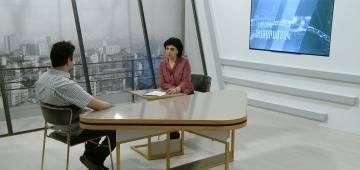 |
Public resistance: a pillar of security
The region is in full swing, the realignment of forces is proceeding with rather harsh conflicts. We have been establishing a peace agenda for more than 3 years, the leaderships of Armenia and Azerbaijan are reaching agreements regarding the handover of the territories of the Armenian villages of Tavush. The low level of public resistance is puzzling. Anna Sargsyan discussed the topic of security with Orientalist Artyom Tonoyan.
|
